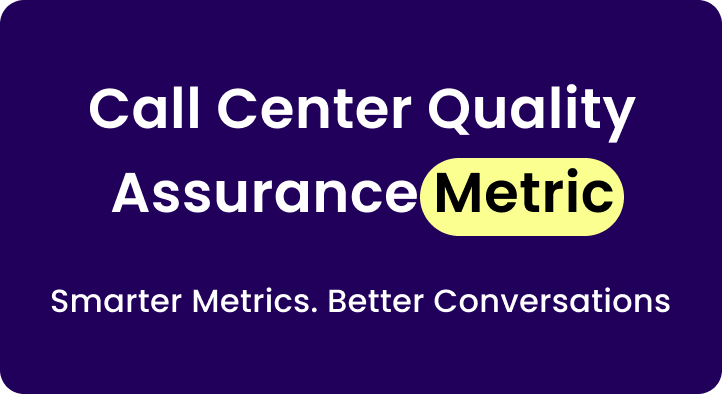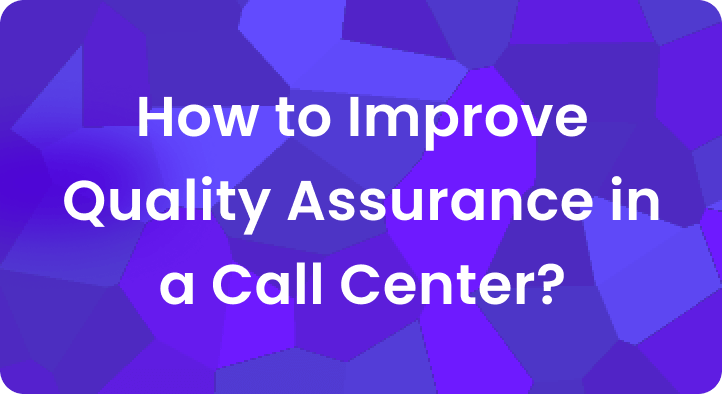What if your call center had an AI manager that could learn, adapt, and make decisions on its own?
Traditional call center AI has limits. It’s often static, scripted, and struggles with the unexpected.
Think of basic chatbots or rigid QA checklists; they only handle exactly what they’re programmed for.
This leaves managers firefighting dynamic challenges with tools that just don’t adapt.
Enter agentic AI.
This isn’t “just another chatbot” or a fancy new buzzword.
It’s like having an autonomous AI co-pilot for your contact center.
It can learn from past calls, make decisions on the fly, and continuously improve without needing you to hand-hold every step.
In this article, we’ll break down what agentic AI means for call centers, how it works, and why it’s a game-changer for managers right now.
You’ll see real use cases, concrete benefits, and a simple roadmap to get started.
Let’s dive in!
A. What is agentic AI?
In a call center context, agentic AI means an AI system with a degree of autonomy.
It can analyze a situation, make decisions, and take action in real time without needing every instruction spelled.
Agentic AI can monitor calls, coach agents, update CRMs, flag compliance issues, and more.
Unlike a static bot, it learns from every interaction.
Instead of only handling basic FAQs, it can tackle complex, multi-step tasks.
Call centers using autonomous AI tools can cut QA time by up to 70%.
Agentic AI examples: a traditional chatbot might only give pre-written answers. An agentic AI, on the other hand, could sense if a customer is upset about a recurring issue and proactively offer a solution or call in a human agent at the right moment.
It works towards outcomes (like resolving the customer’s problem or ensuring quality) rather than just spitting out programmed responses.
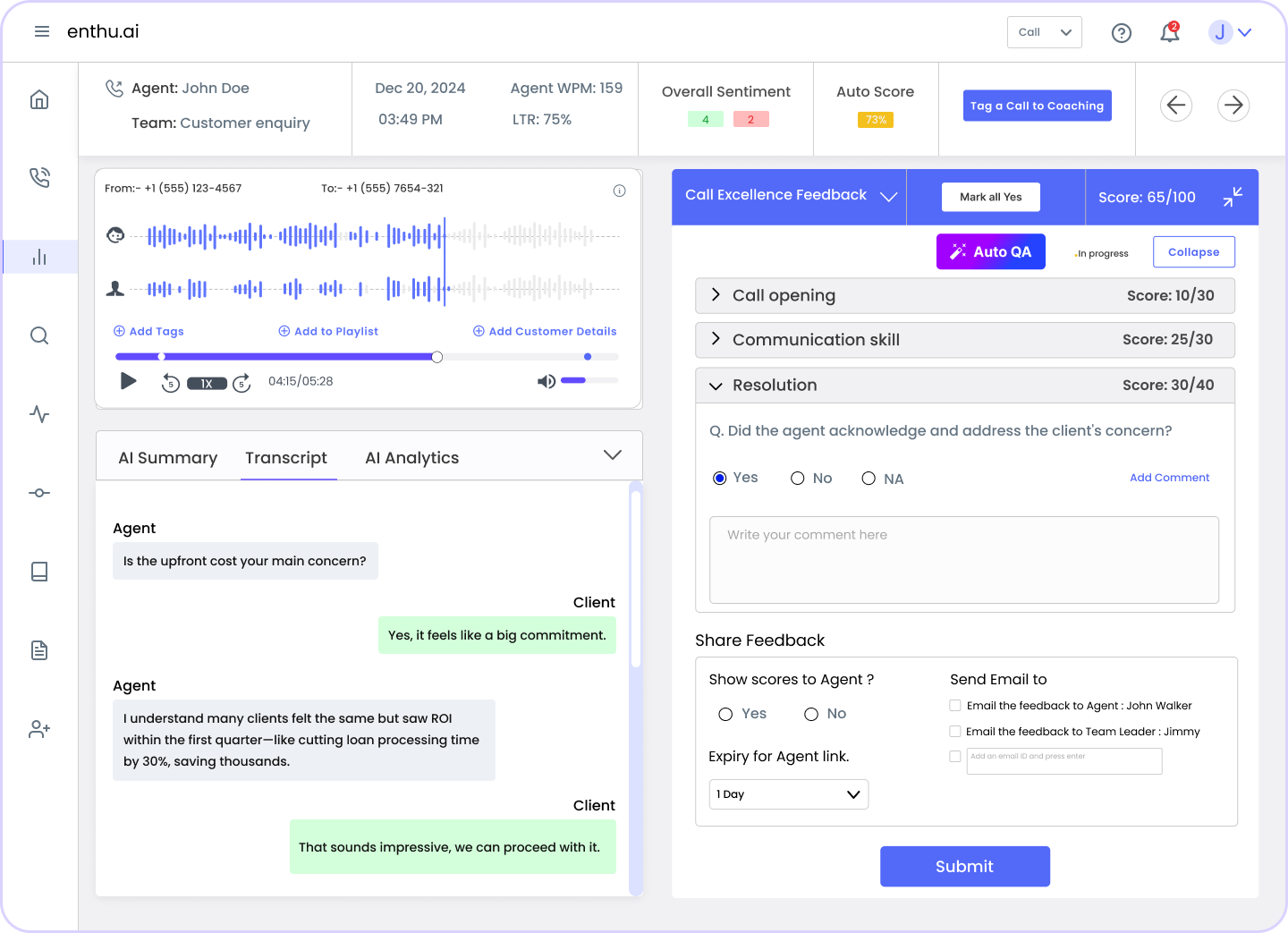
Real definition:
Agentic AI is a type of artificial intelligence that can take action on its own to reach a goal, instead of waiting for step-by-step human instructions.
Think of it like the difference between a GPS and a driver.
- A GPS only gives directions when you ask it (reactive).
- An agentic AI acts like a driver who knows the destination, chooses the best route, avoids traffic, and even learns from past trips to improve the next one (proactive).
In simple words: Agentic AI doesn’t just respond, it plans, decides, and adapts.
B. How agentic AI works in a contact center environment
So, how does this autonomous AI operate day-to-day in your contact center?
The key is decision-making and adaptability.
Agentic AI uses advanced models (like generative AI and “AI agents”) that have contextual awareness and memory.
Imagine a simple call flow: A customer calls with a billing issue.
A traditional system might route them through a fixed IVR menu.
An agentic AI, however, can decide the best course in real time.
For instance, it might recognize that the customer’s tone is frustrated (via sentiment analysis) and skip them ahead to a specialist or offer a callback.
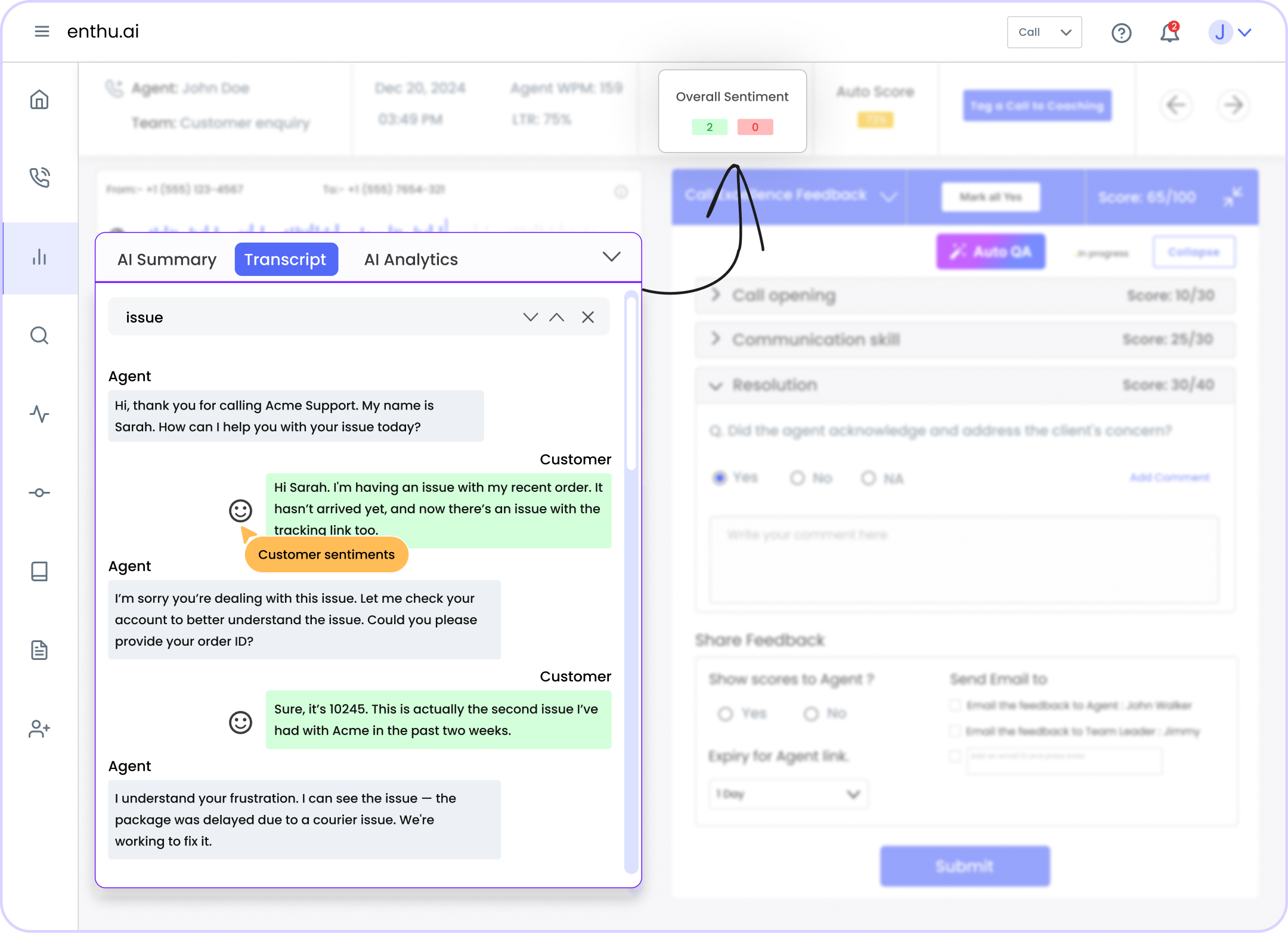
It could even pull up relevant account info and suggest a solution to the agent without being explicitly told to do so each time.
The AI makes these micro-decisions by analyzing live data from the call, comparing it to patterns it learned from thousands of past calls, and selecting the following action that best meets the goal (like first-call resolution or customer satisfaction).
Agentic AI’s adaptability shines in areas like QA, compliance, and coaching, too.
- QA: Instead of following a rigid checklist, an AI QA system uses agentic logic to learn what a good call sounds like. It might start by flagging obvious issues (e.g., the agent didn’t verify a customer’s name). Still, over time, it notices new patterns – say, it learns that unhappy customers often use a specific phrase, and it begins flagging calls with that phrase for review.
- Compliance: In compliance monitoring, the AI can adapt to new regulations by updating its own rules once trained, catching violations like PCI DSS breaches or missing disclaimers without requiring you to program each specific scenario.
- Agent coaching: And for agent coaching, an agentic AI “coach” observes how each rep performs and tailors feedback automatically. For one rep, it might focus on closing skills, for another on empathy, depending on what the AI deems as their weakness from recent calls.
C. Top use cases every call center manager should know
Here are the top use cases that you, as a manager, should have on your radar:
1. Auto QA
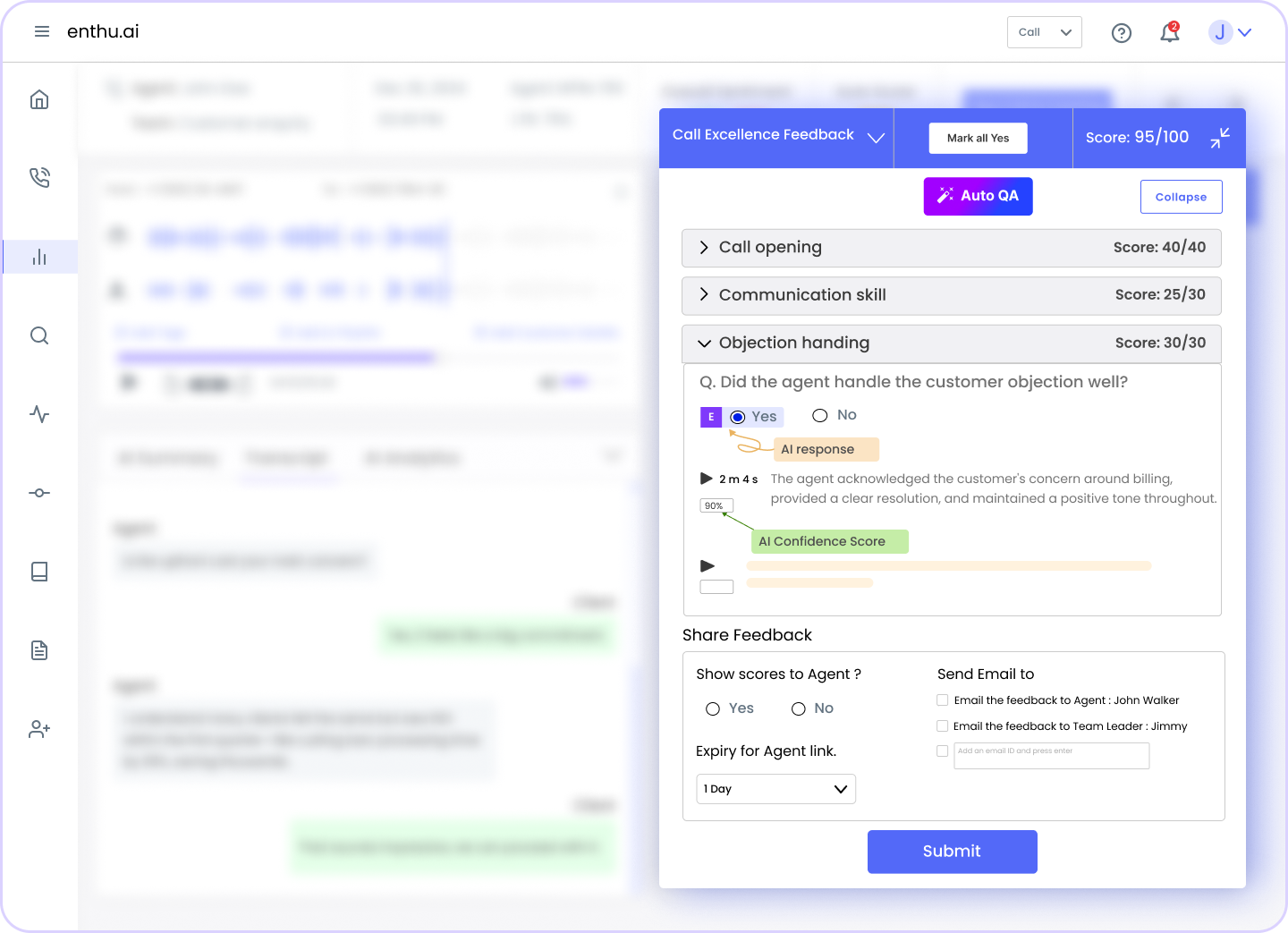
Tired of only checking a tiny sample of calls?
Agentic AI in Enthu can automate QA by listening to every single call and scoring it against your criteria.
Instead of manually reviewing 2% of interactions, AI tools now let you analyze 100% of calls without extra headcount.
The AI flags issues in seconds.
This means you catch problems that would slip through in manual spot checks and free up QA analysts from hours of repetitive listening.
2. Compliance monitoring
Imagine an AI that automatically catches compliance slip-ups – an agent forgetting a required disclosure, or using a forbidden phrase.
Agentic AI can monitor calls in real time or post-call to ensure every conversation meets regulations (TCPA, PCI DSS, etc.).
The moment a rule is broken, it can alert a supervisor or even gently prompt the agent in real-time (“Don’t forget the disclosure”).
This proactive monitoring means no more micromanaging agents for compliance.
The AI has your back, drastically reducing the risk of fines or breaches.
3. Agent coaching
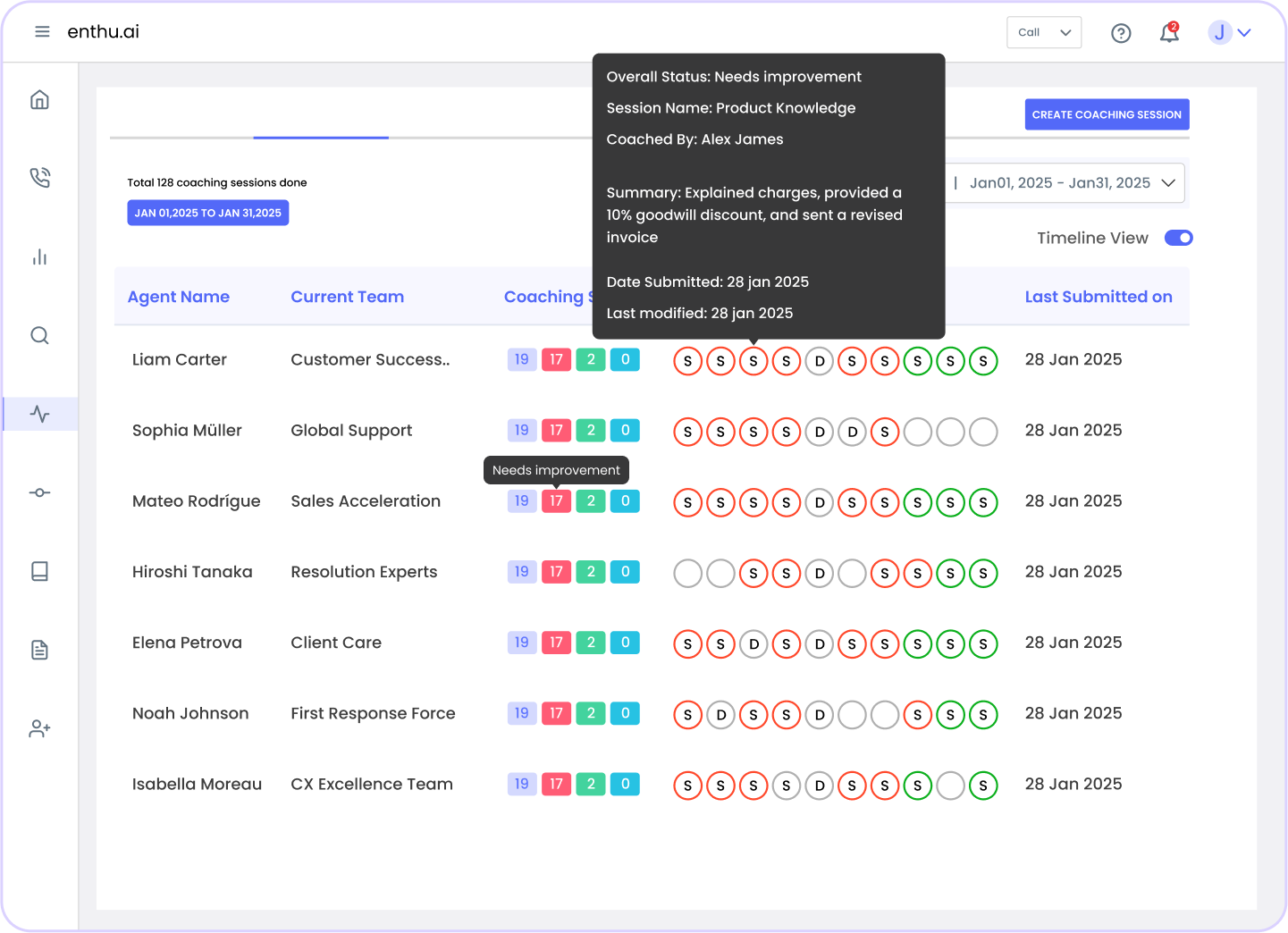
Every agent has different strengths and weaknesses.
Agentic AI can act like a personal coach for each rep.
It analyzes call transcripts and performance data to give targeted feedback.
For example, after each call, it might tell Agent A, “You spoke over the customer twice – try to pause and listen more,” while telling Agent B, “Great empathy on that last call!”
These insights are drawn from patterns the AI sees (e.g., sentiment dips when Agent A interrupts).
Some advanced coaching AIs even role-play with agents for practice.
The result?
More consistent improvements and AI-powered coaching for agents that’s custom to their needs, without waiting for a manager to do a weekly review.
4. Real-time agent assistance
During live calls, agentic AI can serve up knowledge base articles, troubleshooting steps, or reminders exactly when the agent needs them.
If a customer says, “My order hasn’t arrived,” the AI might display the order status and a prompt with an apology and a solution policy.
If it detects an upset tone, it might remind the agent to stay calm and use empathy.
This AI-powered agent assistant reduces hold time (agents don’t have to dig for info) and helps even newbies handle calls like seasoned pros.
5. Workflow automation
So much of a call center rep or QA manager’s time goes into after-call work and admin.
Agentic AI can take over many of these mundane tasks.
For example, it can auto-tag and categorize calls (“this call was a billing inquiry with an upset customer”).
It can update your CRM or ticketing system with call outcomes, schedule a follow-up, or send a summary email to the customer automatically.
By automating these workflows (logging calls, drafting notes, etc.), the AI frees your team to focus on customers rather than administrative tasks.
6. Call transcription & summarization
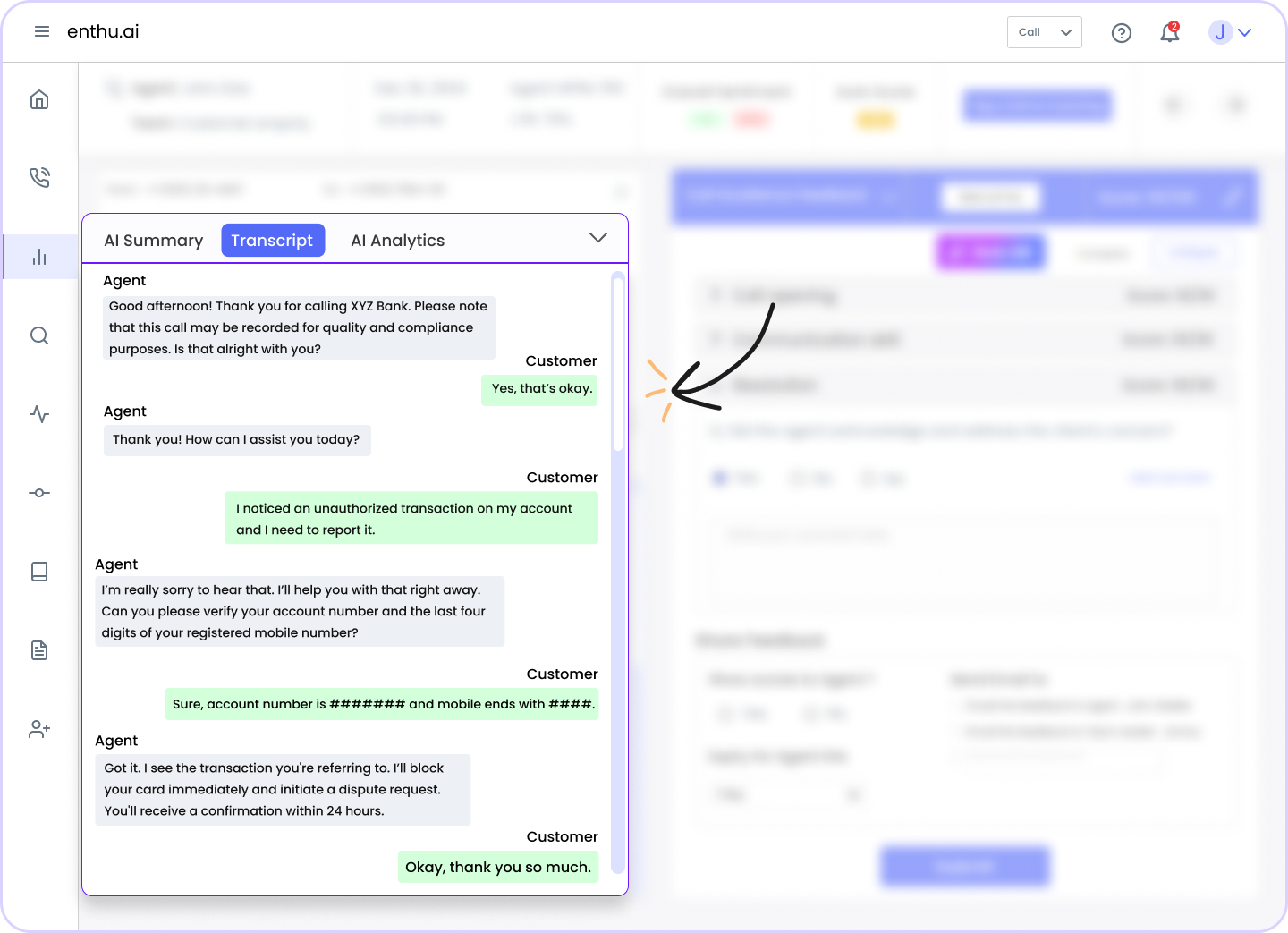
Agentic AI like Enthu.AI can transcribe every call accurately and even produce a short summary of each conversation.
This means right after a call, you have the key points and next steps auto-documented.
Managers can quickly scan summaries to know what happened without listening to the whole call.
Plus, these transcripts fuel all the other use cases (QA, coaching, etc.).
In short, you get instant call insights – search any keyword in the transcripts or review a concise recap instead of wading through hour-long recordings.
D. 6 benefits managers can measure
Alright, let’s talk about the results.
What can agentic AI do for your call center’s performance by the numbers?
Here are six enormous benefits you can take to the boardroom, all backed by measurable improvements:
1. Save QA costs & analyst hours
By automating call monitoring and scoring, you significantly reduce the labor involved in QA.
No more needing a small army to sift through calls.
One case saw an AI system halve the QA review time needed, doubling efficiency.
That means fewer QA analysts tied up in repetitive listening, and those resources can be redirected to coaching and strategy.
2. Improve CSAT/NPS through adaptive service
Quicker answers, fewer transfers, more personalized responses – it all boosts satisfaction.
Companies using AI assistance have seen first-call resolution rates improve 35% and handle times cut by 40%, which directly impacts customer happiness.
Happier customers give higher NPS, it’s that simple.
When your AI helps agents solve issues faster and smarter, customers reward you with loyalty.
3. Shorten agent ramp-up time
Training new agents can take weeks or months until they’re fully up to speed.
Agentic AI accelerates this by guiding rookies in real time and offering on-demand practice.
The result is faster proficiency – leading firms have cut training time to proficiency by
Imagine a new hire performing like a 6-month veteran in a fraction of the time.
Quicker ramp-up means you respond to staffing needs faster and spend less on lengthy training programs.
4. Reduce agent stress & burnout
Reps often burn out from repetitive tasks, high call volumes, and the pressure to perform.
Agentic AI can ease that burden.
It takes over the mundane stuff (note-taking, after-call work, basic queries via self-service) and supports agents on tough calls.
This reduces workload and cognitive stress.
Furthermore, better coaching and real-time help make agents feel more confident – they’re not alone out there.
5. Achieve compliance without micromanaging
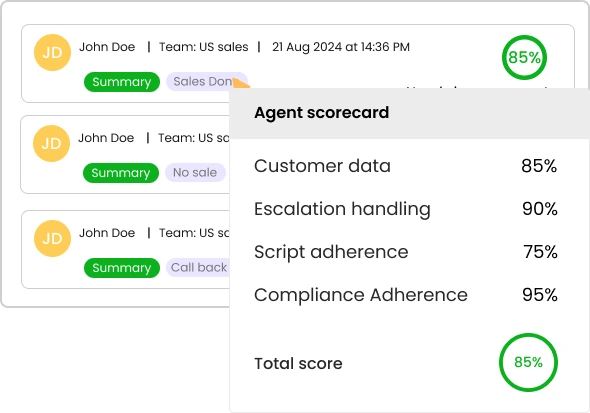
With AI monitoring every call, you get instant alerts on compliance issues and even preventative prompts during calls.
That means you can relax with constant oversight.
The AI will catch the moment an agent strays off script or forgets a required disclaimer, and you can fix it before it becomes a problem.
This benefit is twofold: (a) Risk reduction: avoid costly fines or legal slip-ups because the AI catches them, and (b) Agents feel more trusted: they’re guided quietly by AI, not an overbearing supervisor, which ties back to morale.
You maintain high compliance standards automatically, no micromanaging required.
6. Scale efficiently without adding headcount
Since AI is evaluating calls, assisting agents, and automating workflows 24/7, you can grow your operation without proportionally growing costs.
For example, AI can monitor 100% of interactions with zero extra people on payroll.
It can field routine inquiries (via smart IVRs or chatbots) so your human team deals only with complex issues.
This scalability means if your call volume doubles, you might not need to double your team – the AI absorbs a lot of that strain.
In budget terms, it’s higher output at a lower cost per contact. And in service terms, it means being able to maintain quality as you grow.
E. Implementation roadmap
Ready to bring agentic AI into your call center? Follow these practical steps:
Step 1: spot your biggest gap
Look at your operation and identify the area causing the most pain or where a boost would matter most.
Is your QA process too slow and random? Are you worried about compliance slips?
Or maybe new agents are struggling despite lots of training.
Pick one priority problem that your agentic AI pilot will focus on.
Starting with a clear goal (e.g., “improve QA efficiency” or “ensure 100% compliance monitoring”) keeps things targeted.
Step 2: Run a small pilot on real calls
Don’t try to boil the ocean at once. Choose a limited scope pilot.
Maybe one department or a couple of weeks of calls to test an agentic AI solution on.
For example, you might feed a month’s worth of recordings into an AI QA tool and see how it scores calls versus your current method. Or trial an AI assistant with a few agents on live calls.
Many vendors make this easy; some even offer free trials.
In fact, Enthu lets you try out AI call monitoring on a small scale. They even give five free evaluations to show you how it works.
By piloting, you can gather data on its accuracy and impact in your environment before full rollout.
Step 3: Track key KPIs during the pilot.
Before and after implementing the AI, measure the metrics that matter.
If you’re piloting QA automation, track how many hours it takes to do evaluations now vs. with AI, and whether issue detection (error rates, compliance misses) improves.
For coaching tools, track new hire performance or CSAT changes.
Common KPIs to watch include:
- QA processing time reduction
- Customer satisfaction improvements
- Average handle time changes
- Agent satisfaction scores
- Compliance violation rates
Seeing the numbers move will build the case (and confidence) for broader adoption.
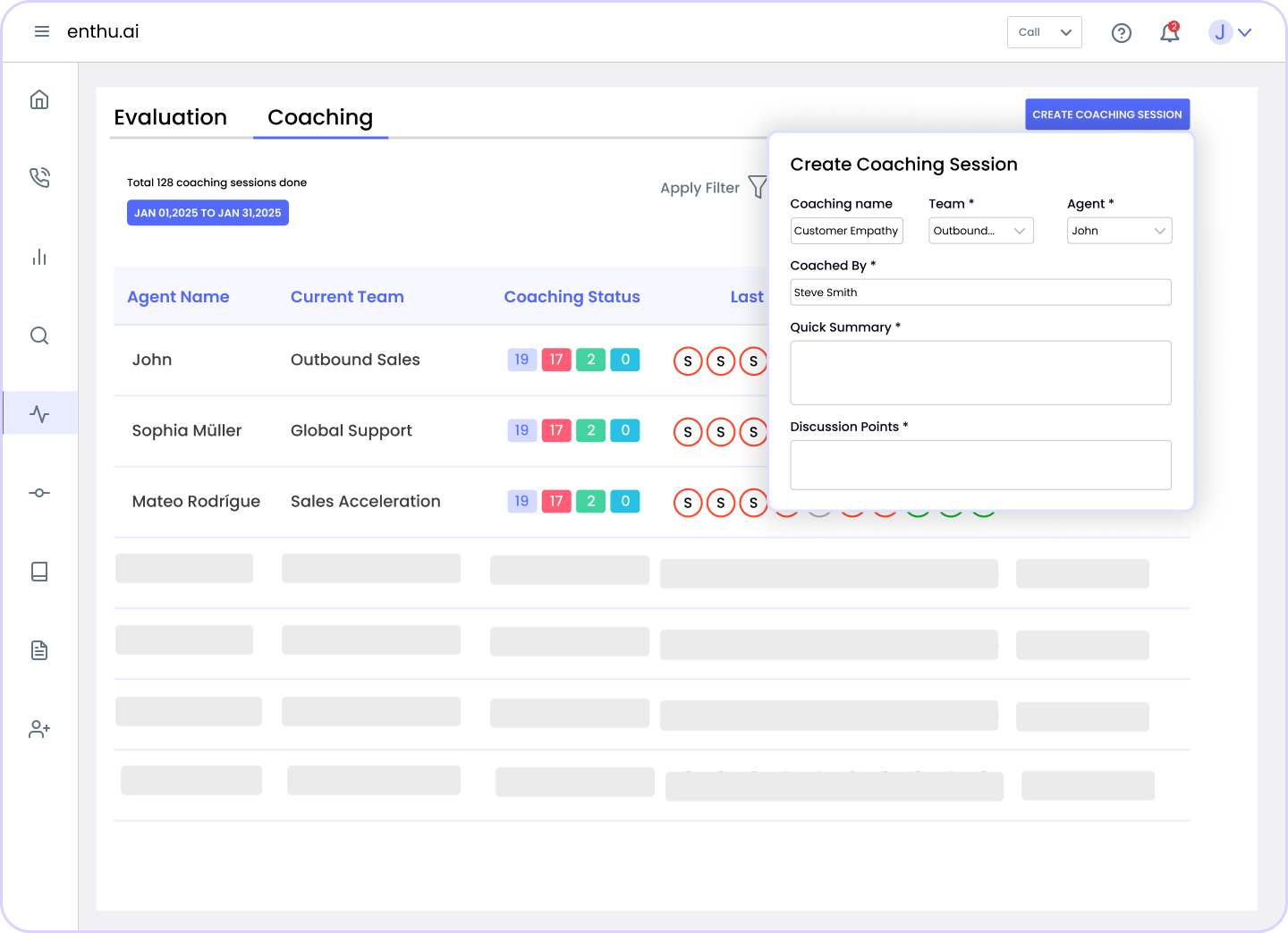
Step 4: Get agent buy-in
Change can scare folks, especially front-line agents who might wonder, “Is this AI here to replace me?”
It’s critical to communicate early and often that the AI is a tool to help them, not replace them.
Emphasize how it will take away boring tasks, make their job easier, and help them shine.
For example, frame the QA AI as “your virtual assistant that flags things so you get quicker feedback, like having a personal coach.”
Involve a few agents in the pilot and gather their feedback; agents who feel included will champion the tech to ptheir eers.
Step 5: Scale gradually and expand use cases
Once the pilot shows promising results and the team is on board, plan a phased rollout.
Maybe you start with just QA automation across all teams.
Then you add compliance monitoring, then real-time agent assist, etc., as you gain confidence.
Scaling gradually lets you adjust processes and ensure the AI is truly adding value at each step.
Also, continue to calibrate and tune the AI with human oversight initially – a concept called “human in the loop.”
Over time, as trust in the AI grows, you can let it handle more autonomously.
Challenges to Watch: Be mindful of resistance to change, data privacy concerns, and the risk of overreliance on AI. Address these early to ensure smooth implementation.
F. The future of agentic AI in contact centers
Agentic AI is set to reshape call centers in the coming years. By 2028, 33% of enterprise software will include agentic AI, enabling 15% of daily work decisions to be made autonomously.
In contact centers, we’ll see AI supervisors managing teams, predicting customer needs, and optimizing staffing.
Early adopters will gain a competitive edge, as AI takes over routine tasks like compliance monitoring, freeing managers for strategic work.
Gartner predicts that by 2029, agentic AI will handle 80% of common customer service issues, cutting operational costs by 30%.
The technology will also expand into workforce management. AI will optimize schedules, predict potential violations, and manage call routing dynamically.
Centers that embrace these changes now will lead their industries tomorrow.
Conclusion
Agentic AI transforms call centers from reactive to proactive operations.
It provides the intelligence and adaptability your team needs to excel.
The technology delivers measurable benefits: reduced costs, improved customer satisfaction, and enhanced agent performance.
Implementation doesn’t require massive changes. Start small and scale gradually.
Your competitors are already exploring these solutions.
The question isn’t whether to adopt Agentic AI, but how quickly you can implement it effectively.
Ready to see how autonomous AI can transform your call center?
Take advantage of Enthu.AI’s 5 free evaluations and discover the difference intelligent automation makes.
FAQs
1. What is agentic AI for customer service?
Agentic AI for customer service is artificial intelligence that acts independently to improve customer interactions. Unlike traditional AI that follows scripts, it learns from each interaction and adapts its responses. It helps with real-time agent coaching, quality assurance, and compliance monitoring without constant human programming.
2. What is the agentic AI in RCM?
Agentic AI in Revenue Cycle Management (RCM) automates billing processes, claims management, and payment collection. It identifies billing errors before submission, predicts claim denials, and optimizes collection strategies.
3. What are the skills of agentic AI?
Agentic AI skills include autonomous decision-making, pattern recognition, adaptive learning, and contextual analysis. It can process multiple data sources simultaneously, predict outcomes based on historical patterns, and adjust strategies in real-time.
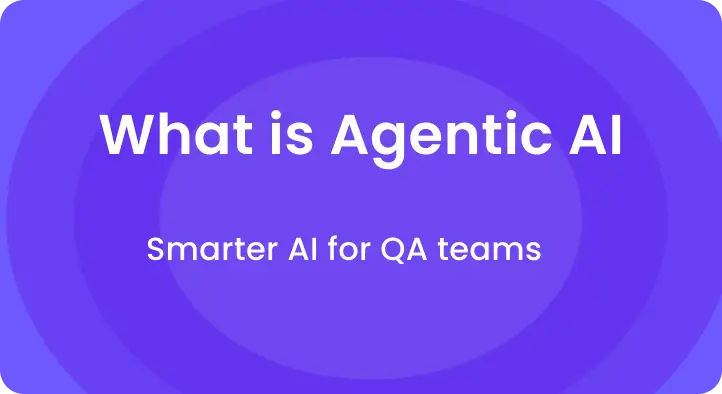
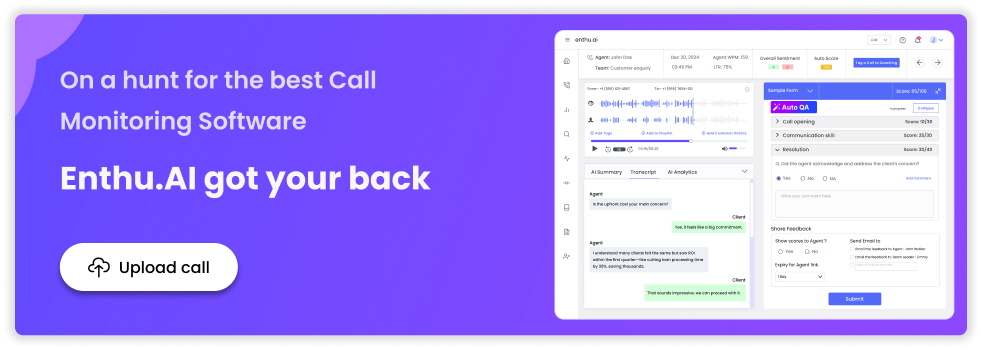


 On this page
On this page
